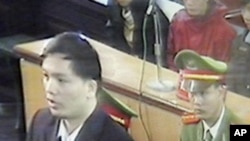Vietnam released a well-known human rights lawyer from jail on March 6, but analysts say authorities are maintaining tight control of political dissidents and pro-democracy activists.
Nguyen Van Dai, 42, was released after serving a four-year prison term and will be under house arrest for four years. He was sentenced in 2007 for Internet posts advocating a multiparty state.
An emeritus professor at Australia's University of New South Wales in Australia, Carl Thayer, told VOA Vietnamese authorities released Nguyen Van Dai on schedule, but will not hesitate to arrest the human rights lawyer again if he resumes his protest.
Vietnam has in recent years largely quelled pro-democracy movements, Thayer said, noting that Vietnamese leaders before a January Communist Party Congress called for action against Vietnamese who form political parties and opposition groups.
Thayer said any talk of revolution in Vietnam does not have "traction." "The [pro-democracy] movement’s been decapitated [and] made leaderless, and the networking that emerged [from] 2006 to 2008 has, I think, been effectively dealt with for the moment," he said.
Thayer says to further its political ambitions Vietnam periodically relaxes pressure on human rights activists in anticipation of high-level state visits or at the urging of foreign governments, particularly the United States.
Human Rights Watch Deputy Asia Director Phil Robertson says Vietnam occasionally eases domestic political repression in order to curry diplomatic favor at multilateral meetings and trade negotiations, but always tries to maintain policies that ensure no large-scale dissident movement gains a "toe hold" in Vietnamese civil society.
He says Vietnam has in recent week’s broadened Internet surveillance out of fear bloggers and dissidents are responding to the public uprisings sweeping North Africa.
"I expect we will see a greater crackdown on freedom of expression because the [Vietnamese] government has started to realize that different groups, whether they be people campaigning about land or on workers’ issues, people involved with ethnic minorities in the Central Highlands, all these people are starting to communicate better through the Internet,” Robertson states. “And so I think that what you will see is at a time when a crackdown is coming, more movement of people into the netspace, where right now they are still able to communicate and get their views out."
Robertson says Vietnam’s 'renewed focus' on pro-democracy activist Nguyen Dan Que illustrates the government’s increasing fear of Internet-aided dissidents. He was arrested on February 26, the same day he authored an opinion piece in The Washington Post newspaper, challenging what he claimed was Hanoi’s indifference to human rights and international law.
The week before his arrest, 69-year-old Que posted Internet appeals calling on young people to challenge Vietnam’s Communist Party by coordinating street protests using mobile phones and the Internet.
Vietnam’s state-controlled media say Que was released on bail February 27, after being held overnight on charges of allegedly trying to overthrow the Vietnamese government.
Despite Activist’s Release, Vietnam Maintains Pressure on Critics




